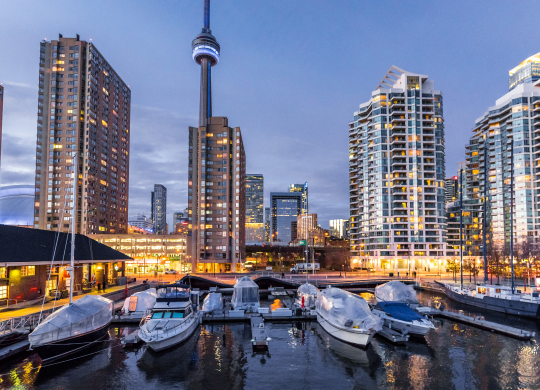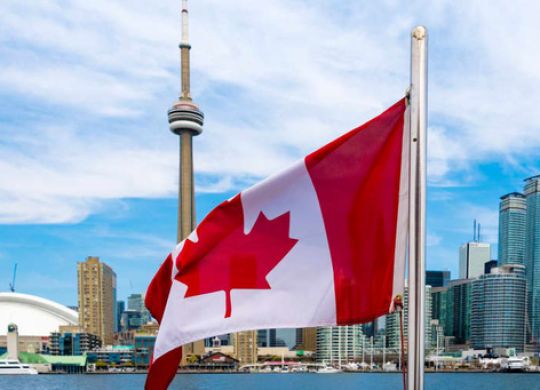Canada wants to welcome almost 1.5 million migrants by 2025

The country's government plans to welcome 500,000 immigrants each year. This means that Canada's population is expected to grow by 1.5 million people over the next three years.
Canada has high hopes for immigration to fill a gap in the economy created by the departure of a huge number of aging workers from the labour market, but not everyone agrees on attracting that many immigrants.
Earlier this month, the federal government announced an ambitious plan to welcome 500,000 immigrants by 2025, with nearly 1.5 million new immigrants coming into the country over the next three years.
Read the top 15 myths about immigration to Canada here.
Why Canada needs migrants
Last year, the country welcomed 405,000 permanent residents - the most in its history.
The reasons lie, to some extent, in simple maths. Like many Western countries, Canada has an aging population with a low birth rate. This means that if the country wants to grow, it needs immigrants. Immigration already accounts for almost all of the country's labour force growth, and by 2032, it is expected to account for all of the country's population growth, according to a government press release.
Canadian authorities are welcoming 1.5 million immigrants into the country. With an unprecedented wave of newcomers, the Canadian government hopes to fill a labour gap in the Canadian economy worsened by an aging population and a mass retirement of the baby boomer generation. That means that the average age of residents is rising steadily, threatening to turn Canada into a nation of pensioners that the working-age population will find it increasingly difficult to support.
CRS system: how many points do you need to move to Canada under the Express Entry program read here.
Incentives for migrants to Canada
That number of migrants per capita is about eight times more than the UK plans to accept, and four times more than the US administration expects to settle in.
Canada has been deliberately encouraging immigration for decades to keep its population and economy growing. Immigrants are granted permanent residency in Canada but not citizenship.
The state of Canada's migrants compared to other countries
If a country wants to grow and develop its economy, it cannot do without immigrants. The growth of labour force in Canada is already almost entirely due to immigration, and by 2032, the government predicts, the same will be true for the population as a whole.
Today, almost one in four residents of Canada is from another country. In all other G7 countries (i.e. the developed countries of the G7), the figure is lower. Take the United States, which is considered the world's centre of cultural intermingling: only 14 per cent of the population is immigrant. The figure is roughly the same in Britain.
Challenges of migration to Canada
In Canada, support for immigration has historically been high. But that does not mean there are no worries about the influx of immigrants. Illegal crossings of the Canadian border from the US have increased in recent years, and the emergence in 2018 of the People's Party of Canada, a populist party with extreme right-wing views, has kept talk on the subject alive ahead of the 2019 parliamentary elections.
When the country's government announced plans to accept up to 500,000 migrants a year, the autonomous province of Quebec, which can set its own quotas on immigrant inflows, said it would agree to accept no more than 50,000 people. That means Quebec, where almost a quarter of Canada's population lives, is willing to accept only 10 percent of the intended arrivals.
76,000 refugees to be resettled in Canada by 2023
Canada has tried to attract immigrants by promising permanent residency, which gives immigrants, who have the right to remain in the country indefinitely but are not citizens, to support population and economic growth.
This plan to attract immigrants to the country would allow Canada to take in about eight times as many permanent residents a year. That's four times more than in the United States.
But among the need for more people at work are growing problems. Large cities like Toronto and Vancouver, where about 10 percent of the population currently lives, have affordable housing crises.
Recommended articles
2 min
Work
Work in Canada in 2025: a detailed guide for foreigners
Canada remains a popular destination for employment of foreigners in 2025. Find out what types of work visas exist in Canada, the requirements for obtaining each type of visa, which cities and industries are most attractive for foreign specialists, where to look for work and much more useful information
25 Apr. 2025
More details1 min
Treatment
Healthcare in Canada for Expats and Medical Tourists: a detailed guide for foreigners
Canada continues to be one of the most attractive destinations for medical tourism in 2025 thanks to a combination of quality, innovation and affordability. Find out how the healthcare system in Canada works, why the country attracts foreigners for treatment, which clinics are the most popular among medical tourists and other important information
30 Apr. 2025
More details3 min
Residence permit
3 min
Expats
Moving to Canada in 2024: Top 5 most popular immigration programs
Every year more and more expats dream of moving to Canada. And this desire is quite real, as the country offers a large number of different immigration programs. Learn more about the top 5 most popular immigration programs to Canada in 2024
04 Aug. 2024
More detailsAll materials and articles are owned by VisitWorld.Today and are protected by international intellectual property regulations. When using materials, approval from VisitWorld.Today is required.
